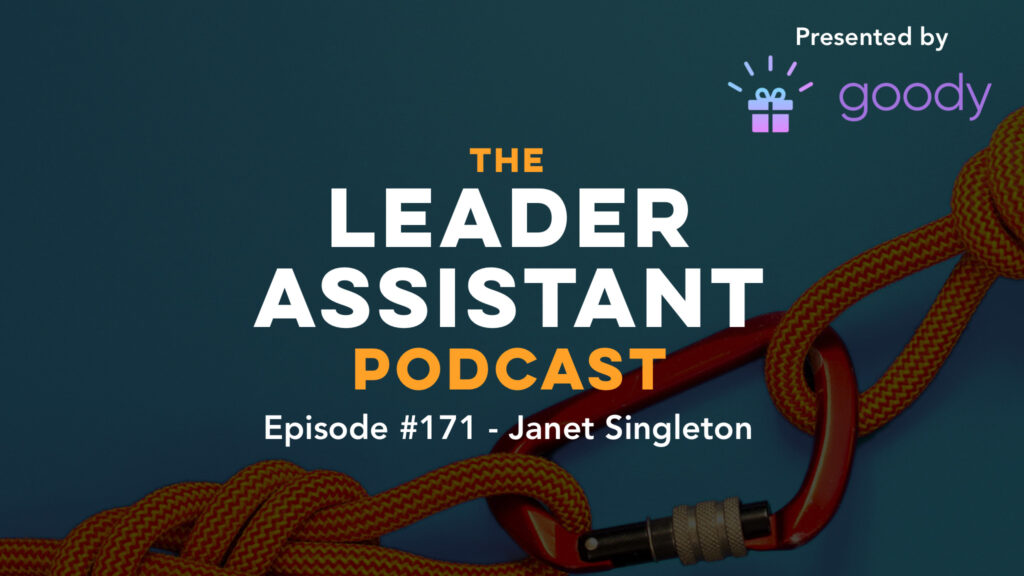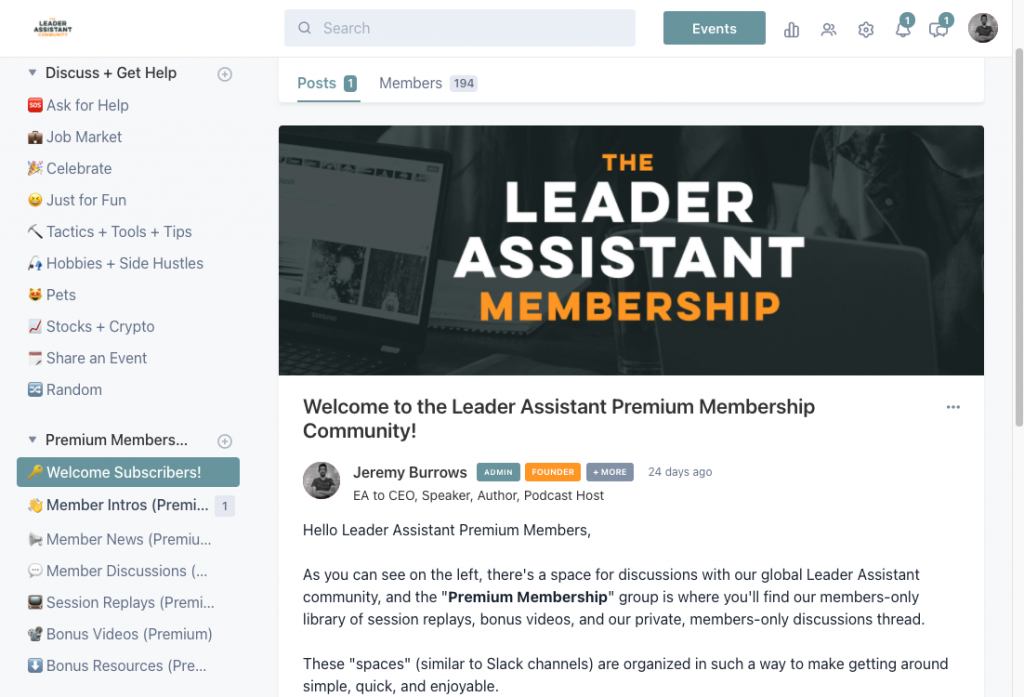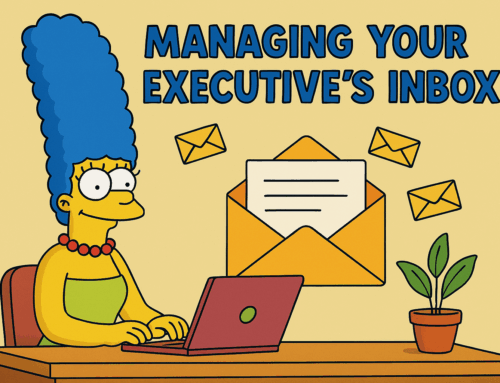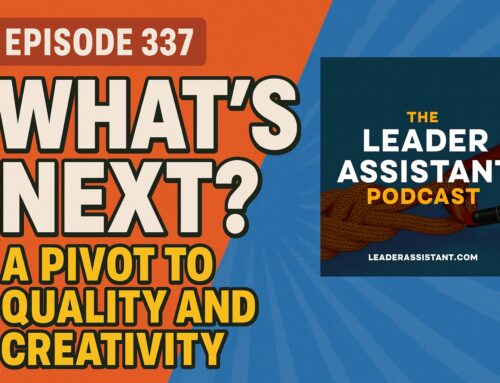Janet Singleton is an executive assistant supporting the CEO and Board Chair of W L Gore & Associates, Inc.
In this episode, Janet talks about working her way up in the same company for 20 years, the importance of development and curiosity, cultivating confidence, and taking risks.
LEADERSHIP QUOTE
What is leadership? Well, a leader is someone who has followers. How did that happen? It is a natural process. When there is someone in my group, the group I belong to, who is knowledgeable, skillful, perhaps dominant, perhaps historically they have been right, etc., etc., and he says, ‘let’s go this way.’
– Bill Gore
CONNECT WITH JANET
ABOUT JANET
Janet Singleton is an executive assistant supporting the Chief Executive Officer and Board Chair of W L Gore & Associates Inc., (a privately held, family company for over 60 years – 3 generations) where she has been an Associate for 20 years. Janet started as a receptionist and has held various administrative support positions. She is passionate about the administrative function, loves to learn, and strives to continually develop and grow in all facets of her life.
THE LEADER ASSISTANT PODCAST IS PRESENTED BY GOODY
A special thanks to my sponsor, Goody!
If you send business gifts to employees, clients or sales prospects, Goody is a game changer. You can send one gift or hundreds at the same time, without ever worrying about shipping details. With Goody, your gift recipients provide all their shipping info, and they can even swap out your gift for another option if they prefer. It’s free to start gifting and you get a $20 credit when you sign up. Oh and if you mention you heard about Goody on The Leader Assistant Podcast, Goody will add an extra $10 credit to your account.
Go here to start gifting today!
THE LEADER ASSISTANT PREMIUM MEMBERSHIP
To learn more about how you can join the now 200+ growth-minded Leader Assistants, check out our Leader Assistant Premium Membership for ongoing training, coaching, and community.
THE LEADER ASSISTANT BOOK
Download the first 3 chapters of The Leader Assistant: Four Pillars of Game-Changing Assistant for FREE here or buy it on Amazon or Audible.
LEADER ASSISTANT LIVE EVENTS
Check out our constantly updated schedule of events for admins and assistants at LeaderAssistantLive.com. Including our all-day, online leadership workshop at leaderassistantlive.com/workshop.
JOIN THE FREE COMMUNITY
Join the Leader Assistant Global Community here, or the Facebook Group here for bonus content and to network with other assistants who are committed to becoming leaders!
SUBSCRIBE
Subscribe to The Leader Assistant Podcast so you don’t miss new episodes!
You can find the show on Apple Podcasts, Spotify, Google Podcasts, Pandora, and Stitcher.
Join my email list here if you want to get an email when a new episode goes live.
LEAVE A REVIEW
If you’re enjoying the podcast, please take 2 minutes to rate and review the show on Apple Podcasts here. Each review helps me stay motivated to keep the show going!
—
EPISODE TRANSCRIPT
Janet Singleton 0:00
Hello, my name is Janet singleton and my leadership quote that I chose is from Bill Bill gore. And it’s what is leadership? Well, a leader is someone who has followers. How does that happen? It is a natural process. When there is someone in my group who is knowledgeable, skillful, perhaps dominant, perhaps historically they have been right. And he says, Let’s go this way.
Podcast Intro 0:27
The Leader Assistant Podcast exists to encourage and challenge assistants to become confident game changing leader assistant
Jeremy Burrows 0:38
The Leader Assistant Podcast is exclusively brought to you by goody which provides effortless gifting for all occasions. If you’re tired of sending tacky impersonal business gifts, then you should definitely check out goody my friends at goody offer a collection of hundreds of curated brands like Levain bakery, Thera body, milk bar, and Ember mugs. With goodie, if your recipient doesn’t like your gift, they can swap it out for one they do like you can find perfect gifts for any occasion. Whether it’s work anniversaries, birthdays, new hire onboarding or company swag. It’s free to start gifting and you get a $20 credit when you sign up. Also, be sure to mention The Leader Assistant Podcast when signing up and goody will add an extra $10 credit to your account. So go to leaderassistant.com/goody to disrupt the inefficiencies in your team’s gifting strategy. Again, that’s the leaderassistant.com/goody Hey friends, thanks for tuning in to The Leader Assistant Podcast with your host Jeremy Burrows and welcome to episode 171 You can check out the show notes at leaderassistant.com/171 Leaderassistant.com/171 and today I’m excited to be speaking with Janet Singleton. Janet is executive assistant at W L Gore and Associates. She supports the Chief Executive Officer and Board Chair Janet, how’s it going?
Janet Singleton 2:20
Well, Jeremy, how are you?
Jeremy Burrows 2:23
I’m doing all right. What part of the world are you in?
Janet Singleton 2:26
So I am located in Elkton, Maryland. That’s not far from where Gore is headquartered in New York, Delaware.
Jeremy Burrows 2:34
Awesome. Are you from that area?
Janet Singleton 2:36
I am, that is where I where I grew up. And I grew up knowing all about Gore in the community. So that was a natural, a natural evolution of that I that I would work there one day.
Jeremy Burrows 2:52
Great. And what did they do what what is WL Gore do?
Janet Singleton 2:55
So we’re most famously probably known for Gore Tex, the gore tex jackets, we make the waterproof and windproof breathable jacket. But we’re in a lot of other applications, such as medical devices, we do stents with the heart. It’s really there’s electrical, electrical devices or in cell phones, we’re in more air and the cables that provide internet on the airplanes, we have been part of the space missions to the moon. And it’s just, it’s been amazing. We have a we use a material called PTFE that we have just found so many applications for and a lot of different products.
Jeremy Burrows 3:41
Wow. So you’re the reason why my executive texted me the other day and said his internet on his plane wasn’t working.
Janet Singleton 3:49
No, that would not be us!
Jeremy Burrows 3:54
funny. All right. Well, thanks for being on the show. It looks like you’ve been at WL Gore for around 20 years. Is that right?
Janet Singleton 4:04
It’ll be 20 years next month. Wow. flown by.
Jeremy Burrows 4:08
And he started as a receptionist. How did you get into like the, you know, kind of work your way up and now you’re supporting the top dog, if you will.
Janet Singleton 4:20
Yeah, it’s been a it’s been a really fun, fun journey, if you will. I’m starting out. I started out right out of college at Gore as a receptionist. And that was a great, a great starting point. For me. I really got to meet a lot of people in that role and felt like I I knew just about everybody in the plant that I worked in. And shortly after I started at Gore I became pregnant and then when I came back, I came back into a different role. So that was my, my first admin assistant role. And from there just kind of moved around within the Division I was in and then eventually one day As the as the assistant for the previous board chair was retiring, and they were doing a transition of the board chair as well. And it was one of those moments that I knew if I didn’t raise my hand and express interest in that I would regret for the rest of my life. So I thought it’s worth a try. And I, I was pleasantly surprised and pleased with the outcome. So I love my job and love what I do.
Jeremy Burrows 5:31
So how long have you supported the CEO?
Janet Singleton 5:34
So that it started off about six years ago with the chairman of the board. And then just about a year and a half ago, the chairman of the board also became the CEO. So it’s a dual role for the past year and a half. Okay. That’s a lot.
Jeremy Burrows 5:51
So you worked with the prior CEO, just not directly?
Janet Singleton 5:55
I did not the prior CEO had had his own assistant.
Jeremy Burrows 5:59
Okay. So you had to work with the with that assistant?
Janet Singleton 6:04
Yes. Yes, we work closely together.
Jeremy Burrows 6:07
Awesome. So what what’s maybe one tip on working well with another assistant in the office.
Janet Singleton 6:16
So I would say a big part is communication without without communication, it’s, you know, really having those regular touch points with someone that you work that closely with is really important. So thinking, thinking to other admins that I work with today, I have regular catch ups, kind of weekly, and then, you know, almost daily as needed, that that communication pieces of how information is, is changing so quickly. In this day and age, it’s really important to just stay in touch and connected.
Jeremy Burrows 6:51
Yeah, yeah. Well said. So you are, you know, you sent me some notes before our conversation, and you had a lot of interesting topics, if you will, that you wanted to talk about. So I’m just going to start asking you about them. And we’ll we’ll have some fun. So the first thing is, you mentioned, you’re passionate about the limitless possibilities of the assistant role. Tell us a little bit about how you’ve seen that there’s essentially no cap to what an assistant can do.
Janet Singleton 7:28
Yeah, it is, it’s a really unique role I have found in that there’s, there’s not this box, like there is around so many other roles, you know, an assistant is really there to serve and support the the executive that they work with. And it can be whatever, whatever and anything that they need help with. And so I know I sometimes will hear other other admins say, well, that’s not real, that’s not admin work. And, you know, I challenged them to think, to think out of that box. And to think that really anything that helps your executive is something that that you can do that is it’s within scope of that admin role. And it just has, it has a huge impact on the customer when you’re willing to kind of step out of that box and, and do things that are not kind of traditional admin work. That opens up a lot of doors and opportunities.
Jeremy Burrows 8:25
Yeah, and, you know, you said, found that assistants will ask their executives, a general question like, What can I do to help? And that’s part of, you know, this limit list idea of, hey, we can we can really help with a lot more than people think. But you recommended that the best way to do it, instead of just asking for help, is to identify how you can help and suggest solutions. So tell us, tell us about how you in your career have attempted to do just that.
Janet Singleton 9:03
Sure. So it’s, it’s one of those roles to Jeremy where I feel like, you know, executives, customers, whoever we are supporting, they don’t always necessarily know how to work with an admin. They don’t know, what, what is admin work. And sometimes I think they’re afraid to ask for certain things, because they’re not sure what we’re what we’re capable of maybe or what is within that scope and that balance. And so, I do often when admins say, Well, I asked, I asked my customer, you know, what I could do to help I encourage them to flip the question and say, you know, well, here’s, here’s what I, here’s what I think I can do for you and ask them would that be helpful? And it’s really kind of flipping that, flipping that page around, how you think about how you help them and really being proactive about identifying ways to help and one of the one of the biggest ways I have found personally to To identify is to get in the room with your customer, or your executive. And, you know, sometimes one of the easiest ways to do that is just to, you know, it’s a very basic offer to take minutes or offer to track action items. And that gets you in the room. And once you are in that room, it opens up all kinds of doors for opportunity for you to hear what’s going on. And beam enables you to be more proactive about how you can help them and and raise your hand, right? It’s not, it’s not about being reactive, and responding to them asking you to do something, it’s about raising your hand and saying, Here’s, I think I can do that. Let me take a shot at it. Or I can draft that for you or get it started in some way. Yeah. So it’s really powerful that just watching and thinking about it in that way.
Jeremy Burrows 10:49
Yeah, I love I love the recommendation to, you know, offer to take notes or circle back with action items, because people are typically looking for help with follow up steps. So that’s a great way to get in the room. So you’ve been an assistant for a while, and I, you know, in my experience, almost 17 years of experience as an assistant as well. So we both know that the role is different than it used to be, and that we’re always having to learn. So how do you continue to reinvent yourself and stay curious.
Janet Singleton 11:33
That’s, it’s an ongoing challenge. And there’s, as you said, the role continues to change and morph over time. And I think one of the biggest things to really expand the role is you have to build that trust and credibility with our customers. And we do this by executing and over delivering on those little things every day. And it’s not just meeting the expectation, but striving to exceed it. And, you know, we look for ways to do more than what they asked to demonstrate that you can identify what they need. And over time that trust leash gets longer and longer. And another thing that I’ve learned over the years is to just say yes, right? It’s not always comfortable. It’s not always what I feel like saying, but when I’m asked to do something, I may not know how to do it, or I may not feel like I have the time to do something, but I know I can figure it out with the help of my admin network. And one of my friends and co workers, she always would say, fake it till you make it. And, you know, when I first started supporting the Board of Directors, I can remember, you know, one of the first meetings they asked me to plan was going to be located in Japan. And at this point, I had hardly been out of the country, but maybe twice in my life and never as far as Japan. So that was a huge stretch for me. But the fact that they had confidence in my ability to pull that off really made me all that more determined not to let them down. And that was a huge learning opportunity for me. So I would encourage people, you know, say yes, and take on that work. And eventually, it gives you that opportunity. So it’s eventually going to become too much, right. But it gives you that opportunity to kind of pick and choose the work that you want to do. And then eventually, you’ll be able to hopefully create a new role and split the work. And I found that to be a neat way to just kind of grow the role over time. And it offers a lot of opportunity.
Jeremy Burrows 13:36
Yeah, so you know, you said your friend said, fake it till you make it. So speaking of friends and network, how have you utilized and connected with other systems in your career to really, you know, bounce ideas off of and grow in your role?
Janet Singleton 13:59
Yeah. So just just recently, Jeremy, so when I, when I first started supporting the CEO, there was a whole, there’s a whole team of, of executives that that the CEO works with, and they all have admins. And so I pulled that group together. And we did, we did a book club with your book, and we would meet once a month and I would send out kind of this homework and we had a discussion guide and that that was was a great learning because we just kind of we we got to know each other and build relationships that way. But it’s created this network that we have where we all feel comfortable reaching out asking, asking questions asking for help sharing knowledge, and it’s it’s turned into, you know, a really neat group of peers for me, and it all started out of you know, it was it was a bit of a risk at first you know, it was something that was not super comfortable, but in the end I think they all really appreciated and valued that experience and the relationships that came out of that as well.
Jeremy Burrows 15:06
I love it. And my favorite part about this is you did this discussion group book club with your team, before I released my work. Yeah. And so actually, I actually was a little a little slow in getting my study slash discussion guide slash workbook for the leader assistant book out. And so you just didn’t let that stop you. And you came up with your own schedule and did it anyway. So props to you.
Janet Singleton 15:37
Yeah, that was, yeah, I definitely look forward to checking out the workbook. So that’s exciting.
Jeremy Burrows 15:43
Yeah. And if anybody is listening in, has grabbed the book, but hasn’t had a chance to grab the workbook. You can go to asst workbook.com. To check out the workbook, Assistant workbook.com. All right, Janet. So I want to hear a story. So you mentioned there was a funny story about or an interesting story about your board meeting, building credibility and trust and being late to board meeting is that right? So tell us about that.
Janet Singleton 16:18
Jeremy, it was, I was so embarrassed. It was. So it was my it was my first real board meeting with, I was still partnering with the person that the that was in this role before. And I was so nervous, like, usually I don’t sleep at all before a big day like that. And it’s especially being new to the role. And I don’t know what it was. But I slept in and completely missed the first topic of that board meeting. And I just felt like I didn’t know what to do. And so I waited till the first topic was over, they had a break. And I snuck in. And, you know, I was just completely mortified. And I’m not sure I’m not sure how many of them even realized it because the case that the person I was partnering was still there. So I think it was a bigger deal to me that it was to them. And afterwards, I went up to the chair of the board and told him later what had happened and apologized profusely and thought for sure I was gonna get fired. And he just kind of he just kind of laughed and said it was okay. And you know, I think he knew it was never going to happen, again. Based on how I was responding, but in that moment, like, in that moment, it was I think, looking back on it a huge trust building moment in that he knew I was going to be honest, and tell him the truth. And I just, it was a it was a big trust building moment, I think for me.
Jeremy Burrows 17:48
Wow. Yeah, that’s the worst sleep and pasture alarm are gonna learn. It’s like the worst.
Janet Singleton 17:56
And yeah, it hasn’t happened since. So.
Jeremy Burrows 18:01
So okay, let’s talk about compensation. Real quick. So how have you you mentioned compensation philosophy is basically compensation follows contribution. Tell us more about that, and how you’ve gone to bat for yourself when it comes to getting paid appropriately.
Janet Singleton 18:25
Yeah, so it Gore are compensated, that is our compensation philosophy as a company is that you’re rewarded with compensation after you after you have contributed. So it’s maybe a little a little different than, than other companies. And that, you know, historically, we, we did not do a whole lot of increases, when you would change a roll, it was more, you do the roll. And then once once you prove that you can do it, then you get, then you get the compensation. So it’s, it’s always pushed me, I think, to prove myself and continuing to, to always challenge myself to grow and develop and, and it’s, it’s worked out well. And another another piece of our compensation philosophy is that we strive to be internally fair and externally competitive and I am part of the committee for the admin function at Gore that that helps to ensure this philosophy around internal fairness and then externally competitive and we go to great lengths to to ensure that we, we accomplish that and achieve that goal. So you know, compensation is a big part of why, why most of us come to work every day. So it is it’s important, and it shows it’s a way to show how we how we value the associates for their contributions.
Jeremy Burrows 19:52
I love the above that that mission statement or value the internally fair and Yeah, that’s great. So okay, so what makes an assistant a leader?
Janet Singleton 20:10
So, a leader is. So it goes back to that quote that I read at the beginning around from Bell Gore, a leader is someone who is who is good at what they do, right. And people naturally will follow someone that has that capability, it’s hard to be a leader and not do the work and not be capable not be in the in the ranks or in the doing the work that you’re that those that you’re leading, are doing every day. And, you know, Gore we do, we have what we call a culture survey every year. And one of the questions on that survey is, I consider myself a leader at gore. And it kind of speaks to that we want everyone to feel like a leader, whether they have it as an official title or not. We’re all leaders in different capacities, we all have different, different topics where we’re knowledge based experts, and at times, the leader will lead and at times, the leader will follow someone that they lead, right, it’s just depends on who has that, that knowledge and the expertise on the particular topics. So I think, to me, that’s the essence of a leader is someone that is good at what they do, and then people naturally follow and look up to them. And in the role of an EA, you’re not going to last long, if you’re not fun to functionally Excellent. And a leader, as an EA, you are a leader, whether you want to be or not. So you have to develop others as that’s how you multiply your impact. And we develop others by sharing knowledge. Some people see knowledge as a as a power, and they hoard it. But true leadership is really evident by sharing knowledge and helping others to grow. And that’s especially true at gore. As part of our culture. We, we we don’t have titles. So that was, you know, calling myself an EA is more of an external thing. We don’t really we’re all associates that gore. And leadership takes different forms, you know, in different situations. So it just depends. Who has that knowledge and expertise?
Jeremy Burrows 22:21
So is that why you keep saying customer? Do you call your managers, your executives, customers?
Janet Singleton 22:28
Yes, that’s another we don’t we don’t really use the word executive. That’s more of a speaking externally. Yeah. So I like it. Yeah. The CEO really doesn’t refer to himself as a CEO, except for externally as well. He calls himself the enterprise leader. So
Jeremy Burrows 22:49
yeah, so Okay, so speaking of the enterprise leader, slash CEO, the board all those higher ups, if you will, you know, you mentioned that you were, you realized that you wouldn’t be able to do the role if you’re intimidated by the power and prestige of supporting those types of people. So how do you kind of work through that? Or how do you recommend assistants listening who are intimidated by CEOs and board members? To work through that?
Janet Singleton 23:25
Yeah, I, so I needed to feel really comfortable asking my questions, sharing my thoughts as I would with anybody else that I had ever supported. And so I that was one of the early things I knew I had to kind of get over. And it helped. I did, I knew the CEO, and the board chair, I knew him, I had worked with him previously, before he became the CEO and board chair. So and it helps, right when they when there’s not a there’s not an ego involved, I think they’re very down to earth normal people. And it’s, you know, part of my role, I think, is helping everyone else see that as well. And so they really are, you know, they put their pants on the same way that we do. And I’m also grateful that I’ve always been treated as valued and smart and capable and important by them as well. And they often will reach out and ask my opinion, and acknowledge the unique position that I’m in and all that I see. And, you know, sometimes they take my advice, and sometimes they don’t, but, you know, it’s, it’s always nice to feel like you had the opportunity to share your thoughts and, you know, potentially have it’s, it’s a very, it can be a very influential role and I try to never take advantage of the position that I’m in and you know, utilize utilize that for my own personal values, thoughts, feelings, you know. So, it is something that it bore, you know, we refer to it as hell of the challenge, I think we need to be comfortable expressing a difference of opinion to with, with those that we support. So they need to not everyone else feels that right. And so someone has to have that relationship to, to really tell them maybe a different opinion that helps them, it helps them in the end. Right.
Jeremy Burrows 25:23
Right. Well, let’s talk about development for a minute. So how have you over your career sought professional development and just kept your kept learning?
Janet Singleton 25:39
Yeah, so early on, I would say, you know, our company would offer different classes and things and that was kind of the extent of, of my learning, you know, we would have, we would have Microsoft classes or classes of on communication that I would take at Gore that they offered. And since I have been in the EAA role, just in the last couple of years, I have started doing a lot of my own searching for, for training and external development opportunities. And I have just been amazed at all of the resources that are available, the books, the trainings, the podcasts, the EA groups, there’s just so many out there. And it’s really been encouraging to me to, you know, this podcast is one example of just the connection with other admins and hearing the work that they do, is really encouraging to me to know that there’s, there’s other people out there that struggle with the same things that I struggle with, and it is a very unique role supporting a CEO, it’s one that you don’t realize, until, until you’re in the seat, I think how challenging it can be. And another one of my one of my former leaders used to say that knowledge is a burden. And that’s, that’s very true. I’ve learned in this role. So just that camaraderie with other with other EAS has been really, really valuable for me.
Jeremy Burrows 27:06
Love it. Are there times in your career where you’ve needed someone to talk to outside of the bubble of gore? And how have you found people to, to vent with?
Janet Singleton 27:23
Right, so my husband takes a lot of that. Yeah, it is. So confidentiality, right is one of the biggest, without confidentiality in this type of role, you really don’t, you’re not going to last too long. So it is one of those things that I I tend to keep most everything to myself, that is confidential, like I said, my husband, he hears a decent amount. So it’s, it is helpful, though, to have that that person that you trust, that you can share with and, you know, maybe it’s not sharing all the details or names, but it’s sharing a situation right and asking for advice. That’s, that’s important to have those relationships.
Jeremy Burrows 28:10
Yeah. Awesome. Well, kind of the last topic I wanted to talk about is confidence. So how have you developed your own confidence over the years?
Janet Singleton 28:23
Well, I will say that public speaking is not not an area where I am confident and, and so this doing this podcast was something where I pushed myself out of my comfort zone. And that is one of the biggest ways where I think we can develop our confidence is by being willing to step outside of our comfort zone and push ourselves and taking on those opportunities that we don’t think maybe we’re capable of but, you know, one of our one of our core beliefs that Gore’s belief in the individual, and we talk about, you know, so many times you hear people tell stories about I didn’t think I could do this, that someone else believed in me. And so I’ve had people that have done that, for me, that has given me confidence. And I strive to be that person also for other people. And as I see admins that are that are younger and coming up the ranks that are I can tell they’re very capable and by, you know, giving them those opportunities, those stretch opportunities, it instills confidence. It’s hard at the time, but we have to develop that muscle and that’s, that’s how they get stronger and more confident.
Jeremy Burrows 29:35
Love it. Well, Janet, thank you so much for sharing great, great tips and wisdom from your years at WL gore and Associates. And yeah, I really appreciate you stepping outside of your comfort zone to be on the show and just putting yourself out there and getting some practice with the things that you may not feel confident in, in a good way. To set an example for those listening, so thanks for being on the show, is there something that or a website or somewhere that people can reach out to you if they want to say hi, or LinkedIn or something?
Janet Singleton 30:12
Sure. Yeah, LinkedIn is definitely the best way to to reach me. And Jeremy, I just want to say thank you for the opportunity. It’s been, I’ve really enjoyed and benefited a lot from your podcasts and your book and just want to say thank you to you for having me here. Today.
Jeremy Burrows 30:29
You are welcome. It’s my pleasure. And I’ll put the LinkedIn URL in the show notes, leaderassistant.com/171. So you all can reach out to Janet and say Hi, and thanks again, Janet.
Janet Singleton 30:43
Great. Thank you Jeremy.
Podcast Intro 30:54
Please welcome you on Apple podcasts. Goburrows.com









